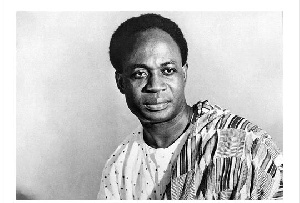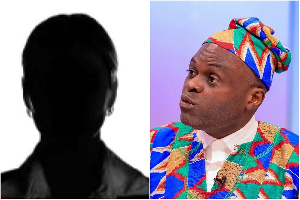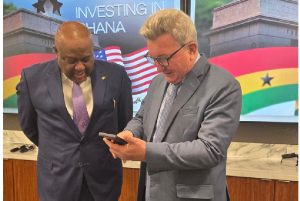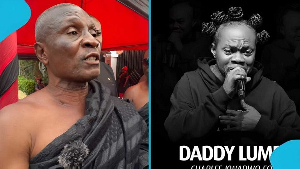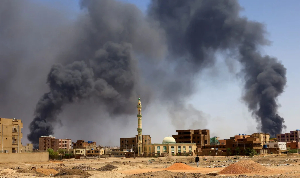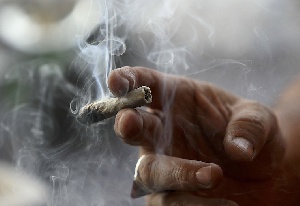They say, if you found yourself in a hole, don’t dig further, it’s my humble advice to Mr. Paul Adom-Otchere. Mr. Adom-Otchere waded into recent debate about Ghana Founder’s Day or Founder’s Day, in which he shot his foot by saying that the first President of Ghana, Dr. Kwame Nkrumah, never contest or was elected as a President of Ghana.
When two ace journalists, Messrs. Kwesi Platt and Malik Kwaku Baako, schooled him about Ghana’s electoral history, he went missing and surfaced up with another theory. Having the media to his side, Mr. Adom-Otchere ridiculed himself further to castigate that Dr Kwame Nkrumah rather became president through plebiscite. Plebiscite (Oxford dictionary) means:
“the direct vote of all the members of an electorate on an important public question such as a change in the constitution”. The Britannica explains further that plebiscite election is “a vote by the people of an entire country or district to decide on some issue, such as choice of a ruler or government, option for independence or annexation by another power, or a question of national policy”.
Mr. Adom-Otchere assertion that Dr. Kwame Nkrumah was handpicked to be the president is an evil mastermind creation diabolically planned to erase the history of Ghana on this earth. From 1951 when made leader of Government Affairs till 6 March 1957 when Ghana had her independence, there were three elections conducted; on 8 February 1951, 15 June 1954, and 17 July 1956 and Dr. Kwame Nkrumah led CPP to victory in all elections.
He also won a parliamentarian seat at Accra-New Town. One should note that the election contacted in 1960 could not be the same as the 3rd Republic election in 1979 when Dr Hilla Limann became president, or the 4th Republic election in 1992 when Flt. Lt (Rtd) J.J. Rawlings became president.
The 1960 election was a plebiscite and presidential election where 2,098,651 Ghanaians voted on 2 issues:
The plebiscite was on 7 March 1960: Ballot Question: “Do you accept the draft republican Constitution for Ghana as set out in the White Paper issued by the Government?”; Presidential Election was 27 April 1960: Ballot Question: “Do you accept Kwame Nkrumah or Joseph Boakye Danquah as the first President under the new Constitution?”
Dr. J.B. Danquah was the presidential candidate of United Party and Dr. Kwame Nkrumah was the candidate of CPP (see below). Is Mr Paul Adom-Otchere confused or just playing partisan politics with Ghana’s political history?
Mr. Adom-Otchere is with the view that no election was conducted in more than one day and since 1960 election was conducted in several days, it is not an election. That is a bit unfortunate for a so-called ace journalist. If you're not critical about your history, that can be a problem because there are young generation, aspiring politicians and all kinds of people who form their opinion based on ill-informed propaganda messages and theories peddled around in academic discourse. I believe any good broadcast, not just Kumawood movies, should have accurate texture to it. It should have information, should have good history, should have something that's offbeat, credible, truthful, integrity and not corrupted or coerced to praise some disgruntled people who would have had it otherwise.
Mr. Adom-Otchere before coming out from his doldrum should have researched about first presidential election in major countries. The United States presidential election of 1788–89 was the first quadrennial presidential election. It was held from Monday, 15 December 1788 to Saturday, 10 January 1789. It was conducted under the new United States Constitution, which had been ratified earlier in 1788. In the election, George Washington was unanimously elected for the first of his two terms as president (see Wikipedia). Can one say George Washington wasn’t elected as a president because US used 27 days to finish their first election and the president was also elected by the Electoral College, an indirect election?
Indeed both Dr. J.B. Danquah and Dr Kwame Nkrumah contest the election as presidential candidates but unfortunately Dr. J.B. Danquah was not born to be a president. And that was not his first time of being disgruntled. From a CIA declassified information, “in Sir Charles Noble Arden-Clarke’s opinion the granting of the title of Prime Minister to Dr. Kwame Nkrumah was a logical move. Since he had in effect been fulfilling the duties of such a post during the life of the present constitution, there was no substantial reason for denying him the title. In addition, Nkrumah had been agreeable to work with the constitution and endeavor to make it a success, although large numbers of the Convention Peoples Party membership had insisted that it was unsatisfactory, “bogus”, etc. The title was thus in a sense a well-earned reward for Nkrumah’s faithful services. Moreover, since Nkrumah was obliged to make promises from time to time to his followers relative to the continued advance toward self-government, the constitutional change would lend color to his assertions along those lines, thereby strengthening his position with his Party.
The Opposition: In the Governor’s view an opposition party could only gain a following by insisting on more self-government that [than] the CPP could obtain. The Governor did not consider the opposition group of Dr. J. B. Danquah as having any substance. The United Gold Coast Convention possesses no following at present, and he doubted that Danquah would ever gain the support of an appreciable number of adherents. He does not have a high opinion of Danquah, whom he regards as extremely self-seeking and unscrupulous.”
The greatness of a historical personality should not be measured by his achievements in an environment of peace, order and abundances; it should be measured against the grave difficulties in which the achievements were made. Dr. Kwame Nkrumah’s unparalleled socio-economic, educational, industrial, scientific, technological, agricultural and cultural accomplishments in the post-colonial Ghana, as well as his unmatched contribution towards the African liberation struggle, was carried out in the environment of systematic internal and external destabilizing campaigns, terrorism, death threats on his life, external economic sabotage and the absence of decolonized African thinkers and brainpower. Dr. Kwame Nkrumah was never a god; he was an astute politician, an indefatigable leader, an able statesman; above all, he was human, he was a man with a dream, a man with vision for Africa - a great man.
Dr. J.B. Danquah had nothing to boast of to be emulated in academic discourse of Ghana independence. Dr. J. B. Danquah was born into an elite society but his way of thinking was far favourable to be the frontrunner of Ghana independence. It needs to be pointed out that Dr. J.B. Danquah was a member of the then privileged Provincial Members of the Colonial Legislative Council in 1946, made up of two intellectuals and wealthy “Chiefs”. US States Department and CIA declassified documents clearly indicated that the 5 of the BIG SIX who founded UGCC were weak and had no vision to spearhead Ghana’s independence that is why they invited Dr. Kwame Nkrumah from London. Dr. J. B. Danquah in his political career won only one election in 1951 on the ticket of UGCC. In 1954 and 1956, despite his brother being the Omanhene of Akyem Abuakwa, Dr. J.B. Danquah lost to Mr. Aaron Ofori Atta of the CPP. Frustrated and disgruntled after losing all elections, Dr J.B. Danquah allowed himself to be use by the United States to undermine Dr. Kwame Nkrumah government. When Dr. J.B. Danquah returned from jail he went to then US Ambassador Mahoney to ask why CIA has stopped paying stipend to his wife when he was imprison. Is United States a Father Christmas given money to imprisoned people? The question of Dr. J. B. Danquah being a CIA agent cannot be hearsay because was outlined in a book entitled JFK: Ordeal in Africa, written by Prof Richard D. Mahoney, the son of then US Ambassador to Ghana and can also be read from Dr Botwe-Asamoah’s book Politico-Cultural thought and policies: An African-Centered Paradigm for the second phase of African Revolution. According to Dr. Botwe-Asamoah, the Preventive Detention Act in 1958 passed by the Parliament, and affirmed by the British Governor-General, to combat terrorism in the newly independence Ghana was a natural measure to maintain law and order, and for the consolidation of the authority of the CPP government. Alternative to this law would have been a civil war, since the NLM was bent on secessionism.
I wonder why Dr. J.B. Danquah is called the Doyen of Ghana democracy. Such a title befits people like Mr. George Alfred Grant, who initiated and formed UGCC, or Doyen of democracy like Mairaj Muhammad Khan of Pakistan, who history cannot sideline them, but not titles bestowed upon on Dr. Danquah by family members like Dr. Kwame Okoampa-Ahoofe Jr. Dr. J.B. Danquah lost his credibility when he wanted to apply force to be Ghana’s leader. Dr. J.B. Danquah sent Dr. K.A. Busia London to make his plea to the British Government to deny granting independence to Ghana since, in his view, the country was not ready for parliamentary democracy. Dr. Busia told the UK government “We still need you in the Gold Coast… Your experiment there is not complete. Sometimes I wonder why you seem such in a hurry to wash your hands off us”. At the time when Dr. K.A. Busia formed and led Unity Party, Dr. Danquah pushed Dr. Busia aside and ran against Dr. Nkrumah. All amounted to null.
I believe majority of Ghanaians believe in pragmatic approach to history, compared to Mr. Paul Adom-Otchere dogmatic insinuation. Wrong does not cease to be wrong because one has the avenue to defend what is indefensible.
Opinions of Tuesday, 8 August 2017
Columnist: Lewis Kwame Addo

